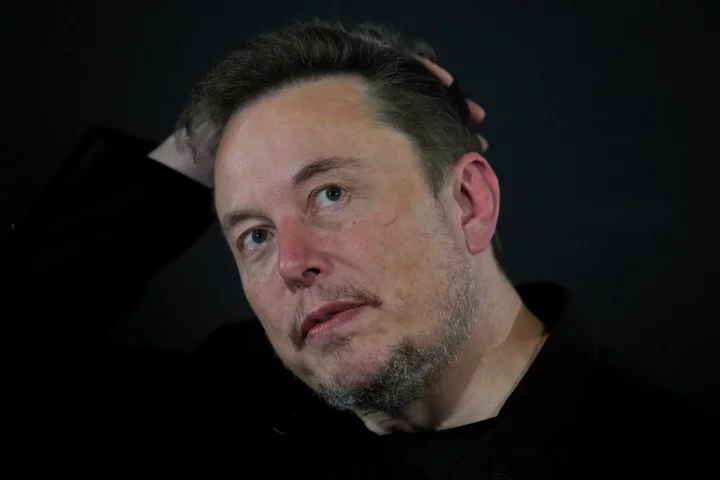
Disney and Apple suspend ads on Elon Musk’s X after he endorses antisemitic tweet
Since Elon Musk took over Twitter last year and converted it into X, critics have warned that his plans for the popular social network could lead to an explosion of hate on the platform. Now, blue-chip advertisers like Apple and Disney are reportedly fleeing X amid an outbreak of antisemitic content on the site — including posts from the billionaire owner himself. X’s content policy ostensibly forbids “targeting individuals or groups with content that references forms of violence or violent events where a protected category was the primary target or victims, where the intent is to harass” including “text that refers to or depicts…genocides, (e.g., the Holocaust),” but antisemitic and pro-Nazi content continues to appear on the network. Mr Musk attracted widespread condemnation on Wednesday when he responded to a tweet echoing claims of the racist and often antisemitic “great replacement” theory, including that Jewish people were “flooding” America with “hordes of minorities” to promote “dialectical hatred against whites, calling the claim “the actual truth.” That theory was among the hateful ideas directly referenced by the gunman who killed 11 people at a Pittsburgh synagogue in 2018, the deadliest antisemitic attack in US history. Later, Mr Musk singled out the Anti-Defamation League, a civil rights advocacy group that monitors antisemitism and forms of extremism, claiming the group promotes “de facto anti-white racism.” ADL CEO responded to the claims, calling them “dangerous.” “At a time when antisemitism is exploding in America and surging around the world, it is indisputably dangerous to use one’s influence to validate and promote antisemitic theories,” he wrote on X. The White House also weighed in, accusing the tech CEO of spreading “abhorrent promotion of antisemitic and racist hate.” “It is unacceptable to repeat the hideous lie behind the most fatal act of antisemitism in American history at any time, let alone one month after the deadliest day for the Jewish people since the Holocaust,” the White House said in a statement. But the controversy was only just beginning. The following day, Media Matters for America, a left-leaning media watchdog group, published an analysis showing advertisements from major brands like Apple, NBCUniversal, IBM, and Oracle appearing alongside openly pro-Nazi tweets on X. In one example, a post claiming Hitler and the Nazis represented a “spiritual awakening” appeared right above an ad for Apple’s Mac computers. Taken together, amid the already tense cultural backdrop of the Israel-Hamas war, seemed to be a breaking point for major advertisers, who were already wary of what the new X/Twitter would look like. On Thursday, IBM told the Financial Times it had “suspended all advertising on X while we investigate this entirely unacceptable situation.” A source at Apple told Axios that the company was doing the same, and a Lions Gate Entertainment spokesperson confirmed that it too was joining the exodus. Disney has also paused spending on X, The New York Times reports. The Independent has contacted X for comment. Company leaders at X have appeared alternatively apologetic and nonchalant. “X’s point of view has always been very clear that discrimination by everyone should STOP across the board – I think that’s something we can and should all agree on,” CEO Linda Yaccarino wrote on Thursday on X. “When it comes to this platform – X has also been extremely clear about our efforts to combat antisemitism and discrimination. There’s no place for it anywhere in the world – it’s ugly and wrong.” Mr Musk, for his part, alternated between jokes and explanations. He shared a clip of someone playing a video game level called “Echo of Hatred,” with the caption “defeating hatred is never easy,” while also endorsing a post about a book that claims IBM punch-card technology enabled the Nazis to carry out the Holocaust. “Clear calls for extreme violence are against our terms of service and will result in suspension,” he wrote elsewhere on X on Friday. Though this week has taken controversy on X to new heights, it’s not the first time the social network has been accused of enabling antisemitism. In September, Mr Musk threatened to sue the ADL, blaming the watchdog group for “trying to kill this platform” with accusations of antisemitism. “To be super clear, I’m pro free speech, but against anti-Semitism of any kind,” he added. At the time, the ADL told The Independent it wouldn’t comment on legal threats, but noted Mr Musk happened to be working on the same side as a “Ban the ADL” campaign created by self-described antisemites. “ADL is unsurprised yet undeterred that antisemites, white supremacists, conspiracy theorists and other trolls have launched a coordinated attack on our organisation. This type of thing is nothing new,” the ADL spokesperson said. “Such insidious efforts don’t daunt us. Instead, they drive us to be unflinching in our commitment to fight hate in all its forms and ensure the safety of Jewish communities and other marginalised groups.” Elsewhere, the network has been accused in recent days of allowing neo-Nazis to profit from X’s creator revenue-sharing programme. This summer, a study from the Center for Countering Digital Hate alleged X failed to take down 99 per cent of a selection of hate content flagged by the group. The group alleged that “the platform is allowing them to break its rules with impunity and is even algorithmically boosting their toxic tweets.” X disputes the findings. Read More White House condemns Elon Musk’s ‘abhorrent’ promotion of antisemitism IBM pulls ads from Elon Musk's X after report says they appeared next to antisemitic posts IBM suspends advertising on X after appearing next to pro-Nazi posts Corporate, global leaders peer into a future expected to be reshaped by AI, for better or worse Elon Musk under fire for calling antisemitic conspiracy theory the ‘actual truth’ Starmer accuses Sunak of ‘fanboying’ over Elon Musk in heated exchange
2023-11-18 16:50

Liverpool fly Luis Diaz’s parents to UK for Christmas with son after kidnapping
Liverpool have flown Luis Diaz’s parents to Merseyside so they can spend Christmas with their son after their recent kidnapping ordeal. Cilenis Marulanda was freed almost immediately after being taken by guerrilla group the National Liberation Army earlier this month but father Luis Manuel was held captive for 12 days until being released late last week. Diaz was reunited with his parents when he returned to Colombia for international duty and the pair were in the crowd to see their son score both goals in an emotional 2-1 victory at home to Brazil on Thursday. The PA news agency understands that following the game Liverpool paid for a private jet, for security reasons and to help manage the family’s trauma, to bring Diaz’s parents and wider family to Merseyside so they could spend an extended period of time together. Their plane was scheduled to land at Liverpool’s John Lennon Airport early on Saturday morning. Since Diaz’s parents were kidnapped, the club have endeavoured to provide the best possible support, with manager Jurgen Klopp allowing Diaz compassionate leave and leaving decisions about when he trained and was available for selection entirely up to the player, in keeping with the family values they believe are vital to the club’s ethos. Diaz will rejoin his family in Liverpool when he returns from international duty after their match in Paraguay on Tuesday. He will be on a flight with the club’s other South American players Alisson Becker, who was beaten twice by his club-mate in their game in Barranquilla in the far north of Colombia, Alexis Mac Allister and Darwin Nunez – who faced each other in Argentina’s 2-1 defeat by Uruguay – in a plane jointly chartered by a number of Premier League clubs to return their players home as expediently as possible. Liverpool head to Manchester City in a top-of-the-table clash at the Etihad Stadium next Saturday lunchtime. Read More On this day in 2013 – Elena Baltacha announces retirement from tennis England display against Malta ‘not a worry’ ahead of Euros, Gareth Southgate insists Stephen Kenny insists ‘no pressure’ on Evan Ferguson against Netherlands
2023-11-18 16:20
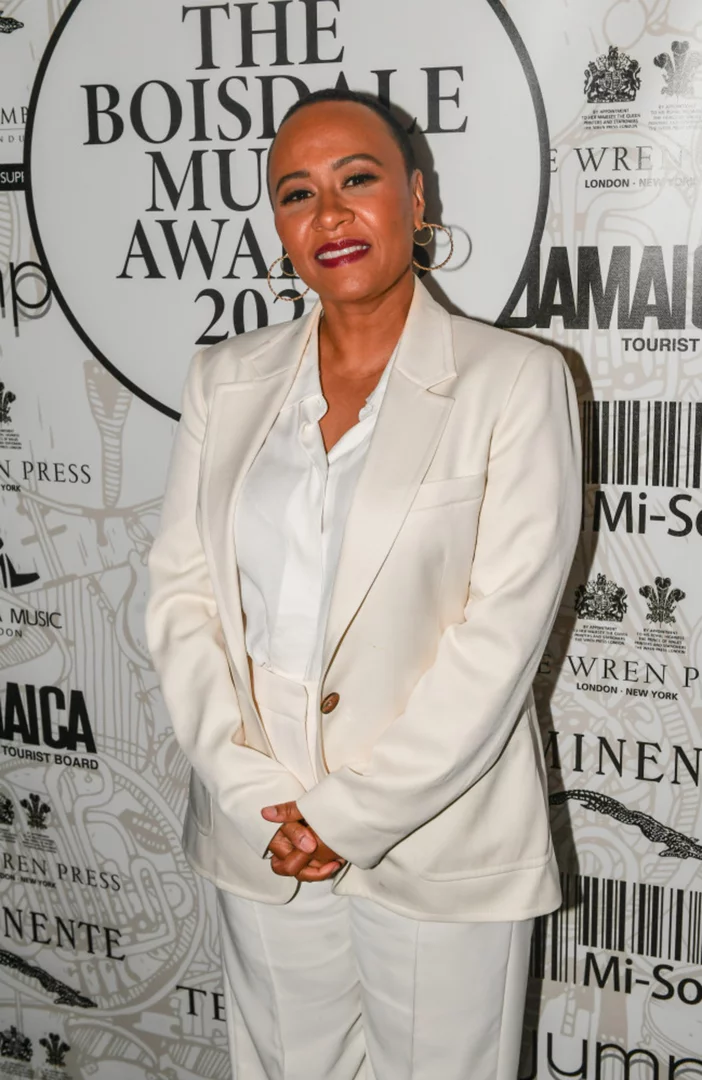
Emeli Sande can 'understand' her songs much better now that she is older: 'I predicted my future!'
Emeli Sande thinks she has "predicted her own future" with her music as she has learned to "understand" what she was trying to say in her early hits.
2023-11-18 16:18
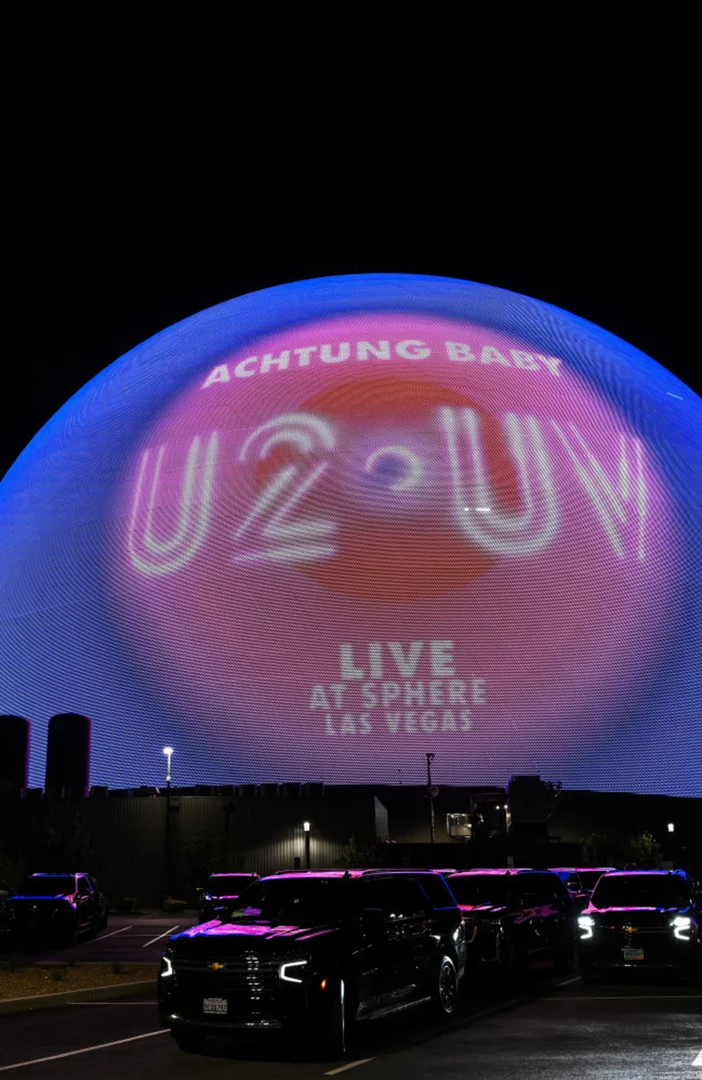
'You do need to drive the system a little hard': U2's Sphere Las Vegas show wasn't rock 'n' roll enough
U2 have had to tweak how they play at their Las Vegas residency show.
2023-11-18 16:17

Israel Latest: Ground Assault May Be Extended to South Gaza
Israel said its ground offensive in the north of the Gaza Strip may be expanded to the south
2023-11-18 15:29
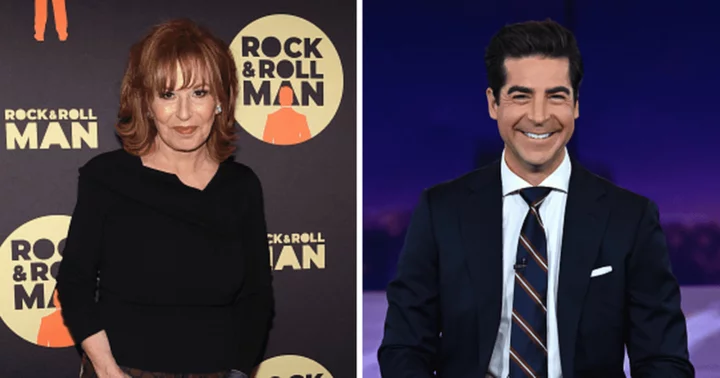
Internet joins The View's Joy Behar in mocking Fox News and Jesse Watters over 'Pride Nutcracker' coverage
Joy Behar shreds Fox News host Jesse Watters after his coverage of Target’s 'gay nutcracker' and other Christmas ornaments
2023-11-18 15:22

Rescuers in India tunnel collapse begin replacing drilling machine on 7th day
By Saurabh Sharma SILKYARA, India (Reuters) -Rescuers trying to reach workers trapped for nearly a week in a collapsed highway
2023-11-18 14:54
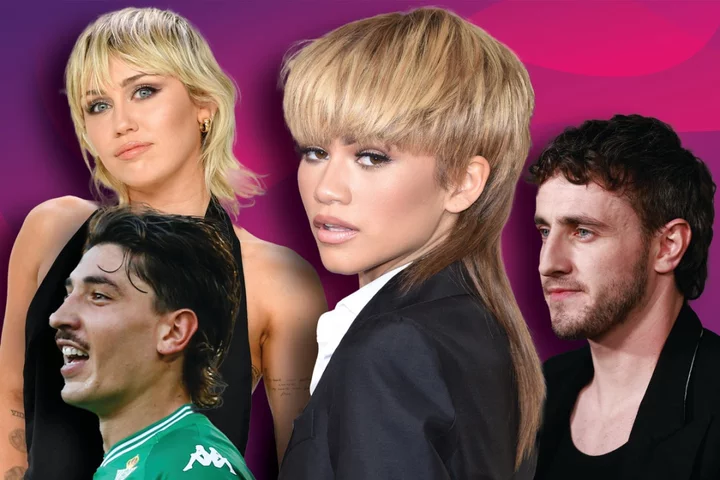
Mullets are officially back. And, no, we haven’t lost our minds
Everywhere I go, I am being stalked by mullets. Walk into a pub in the vicinity of Hackney, east London, and you, like me, will be haunted by the sight of them. Queue for a Fred Again concert and you’ll see an ocean of the things. Go to a rugby match at Twickenham Stadium, and there will be as many mullets as there are team shirts. Whether you know it as the mullet or the “Kentucky waterfall” or “beaver paddle”, they’ll have been in your sightline as of late. The hairstyle, which involves a shorter crop at the front, top and sides, and longer in the back, is currently being paraded by on-screen heartthrobs like Paul Mescal, Australian actor Jacob Elordi and American movie star Timothée Chalamet. In the world of sport, Spanish footballer Hector Bellerin, British rugby player Joe Marler and Formula One driver Valtteri Bottas have all rocked the hairstyle this year (and that’s not forgetting about 90 per cent of “Aussie rules” football players have mullets right now too). But its ubiquity in modern pop culture goes back a few years. Singer Lil Nas X, for example, turned up at the MTV Awards in 2021 wearing a curly, layered version of the hairstyle. Women have been wearing the coiffure even longer. Pop culture mainstays like Rihanna and Zendaya have both worn mullets on the red carpet, in 2013 and 2016, respectively. By 2021, Miley Cyrus was donning the style. That same year, Vogue hailed the mullet as the unlikely star of modern street style. The mullet has also stormed down fashion week runways, with Junya Watanabe, Stella McCartney and Alexander McQueen all incorporating the hairstyle into their 2022 shows. If that wasn’t enough proof of the mullet going mainstream, a failsafe method for judging something’s popularity is when that trendy thing gets banned in schools, or there’s a level of moral panic about it. That happened last month when a Sunderland schoolboy’s mullet was decided to be so “extreme” that he was put in isolation and ordered to chop it off. Meanwhile, even more Brits are trying to catch up with Australian mullet culture: a doctor from Dorset made headlines this week as he has been growing his locks in preparation for the world mullet growing championships in Australia, a contest that he said was “widely considered to be the Everest of the competitive mullet growing world”. We’ve all gone mullet mad. Though the name itself wasn’t coined until two decades ago – the Oxford English Dictionary credits the Beastie Boys’ 1994 song “Mullet Head” for the popularisation of the word – the mullet existed long before that. In his book Mullet Madness, Alan Henderson writes that prehistoric people may have figured out that having their hair cut shorter at the front and longer at the back meant they could keep their hair out of their eyes and their necks still toasty. What’s more, Ancient Greek texts referenced men with mullet-style cuts, while depictions of Greek gods that date back to the 6th century suggest that the hairstyle existed even then. In certain indigenous populations in the US, long hair symbolises power and a connection with the divine, and a version of the mullet – the front spiked and the back long – is considered a traditional style in tribes of the western United States like the Blackfoot and Crow. The version of the mullet we see in popular culture today, though, strongly harks back to David Bowie’s tangerine-orange waterfall-style mullet worn as his alter ego Ziggy Stardust. In the Seventies, it set a cultural precedent for the mullet as a fashion statement. Back then, the hairstyle was subversive. It spurred strong reactions from the more conservatively coiffed elite because it refused to conform to any one standard: the mullet is both long and short; masculine and feminine; somehow, scruffy while slick. The mullet’s return could be seen as a happy accident. In lockdown, men would scissor away at their locks, crafting eccentric hairstyles out of sheer boredom, sharing pictures of the resulting cut to their respective WhatsApp group chats. But that comedy mullet has since died out. A fashionable, en-vogue hairstyle has stuck around. In searching for the perfect modern mullet, men have downed tools and turned to the professionals for help. Ryan Lewis, owner of Club 13 barbershop in Hull, says that about one-third of his customers are opting for mullets. “Its presence within combat and contact sports alone conveys a modern masculinity that has trickled down into the mainstream,” he says, adding that the “harsher cuts” seen in rugby culture are being cancelled out by the more subtle, feathery mullets worn by Mescal et al. “The modern mullet is bringing a more natural and effortless look with a softer and less obnoxious shape.” James Doyle, the manager of Bristol barbershop Harry Blades and Angry Daves, says it’s not just people who work in non-corporate environments who are taking the plunge, either: it’s becoming workplace-appropriate. “You would think it’s only the musicians or creatives,” he says. “But I’ve got a couple of accountants that are rocking mullets. Anyone and everyone seems to be jumping on the trend.” The mullet trend allows men to be more expressive and embrace their individuality. I had a sixth form student come in the other day and ask for a mullet – young men are becoming more daring with their hair Samantha Perkins, salon owner and lecturer The style has become so sought after that hairdressing schools are changing the way they train stylists, too. Samantha Perkins is the owner of the salon Hair by Sam and lectures at the London Hairdressing Academy, and says that the academy has launched special masterclasses in the art of cutting mullets due to popular demand. “It’s very technical,” she explains. “It’s cut with scissors and razors, so without using clippers – so it’s already a level three cut without a doubt. Students really need to understand the hair type to execute the look.” Perkins adds that the supremacy of the cookie-cutter “short back and sides” haircut that has dominated men’s hairdressing trends for the past decade is on its way out. “The mullet trend allows men to be more expressive and embrace their individuality,” she says. “I had a sixth form student come in the other day and ask for a mullet – young men are becoming more daring with their hair.” Michael Kent, a stylist at Blue Tit hair salon in London, agrees that the popularity of the mullet hairstyle has opened up a new way of self-expression for men. “Men’s hair has always been so bland and [the mullet] has allowed people to really embrace their individuality. In popular culture, a lot of people are more comfortable in their sexuality and diversifying so much. We’re seeing a lot of clients coming in and asking for a cut like Timothée Chalamet’s. Before, people would ask for Ed Sheeran’s hair, so you can see how it’s changing.” The mullet is not just limited to men, either. The coif has long been donned by famous women (Scarlett Johansson, Joan Jett and Dolly Parton have all worn variations of the style over the years), and both Perkins and Kent say they have women customers asking for the same. “The mullet is a genderless cut,” says Kent. “Women and men are really embracing it – it’s an androgynous look.” And if you want to try the mullet yourself, Kent assures me it suits most people: “It’s like a wig you can put on anyone!” Read More Women’s scarves and crocheted ties - what is Robert Peston wearing now? I salute Dolly Parton’s beauty routine – no one sees me without my make-up How Naomi Campbell proved all her haters wrong – including me Women’s scarves and crocheted ties - what is Robert Peston wearing now? I salute Dolly Parton’s beauty routine – no one sees me without my make-up How Naomi Campbell proved all her haters wrong – including me
2023-11-18 14:49
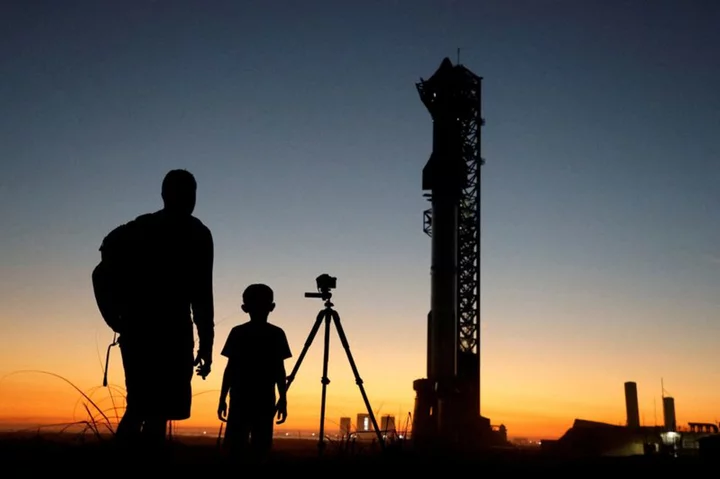
SpaceX Starship set for repeat test flight, seven months after last one blew up
By Joe Skipper, Joey Roulette and Steve Gorman BOCA CHICA, Texas SpaceX's next-generation spacecraft Starship, developed to carry
2023-11-18 14:24

'Love Island Games' viewers criticize islanders on Peacock show for saving Johnny Middlebrooks from elimination
The viewers fumed over the islanders for not targeting Johnny Middlebrooks which has saved him constantly from being dumped
2023-11-18 14:23

Ford workers join those at GM in approving contract settlement that ended UAW strikes
The United Auto Workers union has overwhelmingly ratified a new contract with Ford, a pact that, along with similar deals with General Motors and Stellantis, will raise pay across the industry
2023-11-18 14:23

Rwanda flights: Could next step harm Good Friday Agreement?
The European Convention on Human Rights is tied to the 1998 agreement, as BBC News NI explains.
2023-11-18 14:23
